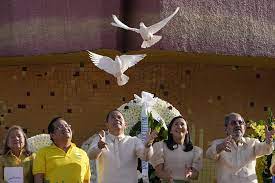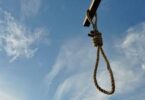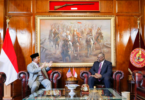MANILA (AP): Pro-democracy protesters marked the anniversary on Saturday of the 1986 army-backed “people power” revolt in the Philippines with the son of the late Ferdinand Marcos, who was ousted in that uprising, now the president in a stunning comeback.
About 1,400 demonstrators, some waving Philippine flags and holding placards that read “Never forget,” gathered at a democracy shrine along the main EDSA highway in the Manila metropolis. An equal number of left-wing activists, carrying an effigy that depicted Marcos Jr. as a pest, protested separately at a nearby pro-democracy monument.
Millions of Filipinos converged in February 1986 at the usually traffic-choked thoroughfare to shield top military and defense officials who defected from the administration of then-President Ferdinand Marcos and braced for battle in two adjacent camps. The ailing president, who imposed martial rule from 1972 to 1981, was driven with his family and cronies into US exile, where he died three years later.
The uprising awed the world and became a harbinger of change in authoritarian regimes. But in the nearly four decades since the uprising, poverty, landlessness, stark inequality between the rich and poor, and injustices have remained deeply entrenched and shrouded the nearly bloodless revolt’s legacy.
The Marcoses returned to the Philippines in 1991 and gradually rose back to political power despite the plunder and widespread human rights atrocities that forced the family patriarch from power to global infamy.
In May last year, Marcos’s son and namesake won the presidential race in a landslide victory in one of history’s most dramatic political comebacks.
“It’s mind-blowing in one sense, isn’t it? How did this happen? You remember those who sacrificed their lives and you feel so sad for those who were tortured, those who lost loved ones,” Judy Taguiwalo, a longtime former political detainee and torture survivor under the dictatorship, told The Associated Press.
Now 73 and ailing, Taguiwalo said her generation of activists who fought the dictatorship was slowly fading, and many have died, but she remained optimistic and defiant.
“There’s a new generation of fighters,” she said. “Tyranny can return but there’s no forever in tyranny so long as we don’t stop resisting even if it’s an uphill battle or we get sidetracked by disinformation.”
Marcos Jr.’s supporters called his massive victory a political vindication but opponents said he climbed back to the top post through well-funded social media propaganda that whitewashed the family history in a country regarded as one of the top users of the Internet and social media, including Facebook and TikTok.
He had steadfastly rejected calls by anti-Marcos groups for him to apologize for the atrocities and plunder under his father’s rule and said in a TV interview at the presidential place in Manila in September that labeling his father a dictator was wrong.
Faced with the awkward situation of issuing a statement to mark the 1986 revolt that toppled his father, Marcos Jr. called for reconciliation without any reference to the event as a democratic milestone as his predecessors did.
“I once again offer my hand of reconciliation to those with different political persuasions to come together as one in forging a better society — one that will pursue progress and peace and a better life for all Filipinos,” Marcos Jr. said in a two-paragraph statement he posted on Facebook.
“As we look back to a time in our history that divided the Filipino people, I am one with the nation in remembering those times of tribulation and how we came out of them united and stronger as a nation,” he said.
Renato Reyes of the left-wing alliance Bayan said the president’s offer was a “good sound bite but lacks sincerity and substance” given Marcos Jr.’s refusal to acknowledge abuses under his father’s rule.
The ousted president died in exile in Hawaii three years after being overthrown without admitting any wrongdoing, including accusations that he and his family amassed an estimated $5 billion to $10 billion while he was in power.
A Hawaii court later found him liable for human rights violations and awarded $2 billion from his estate to compensate more than 9,000 Filipinos who filed a lawsuit against him for torture, incarceration, extrajudicial killings and disappearances.







